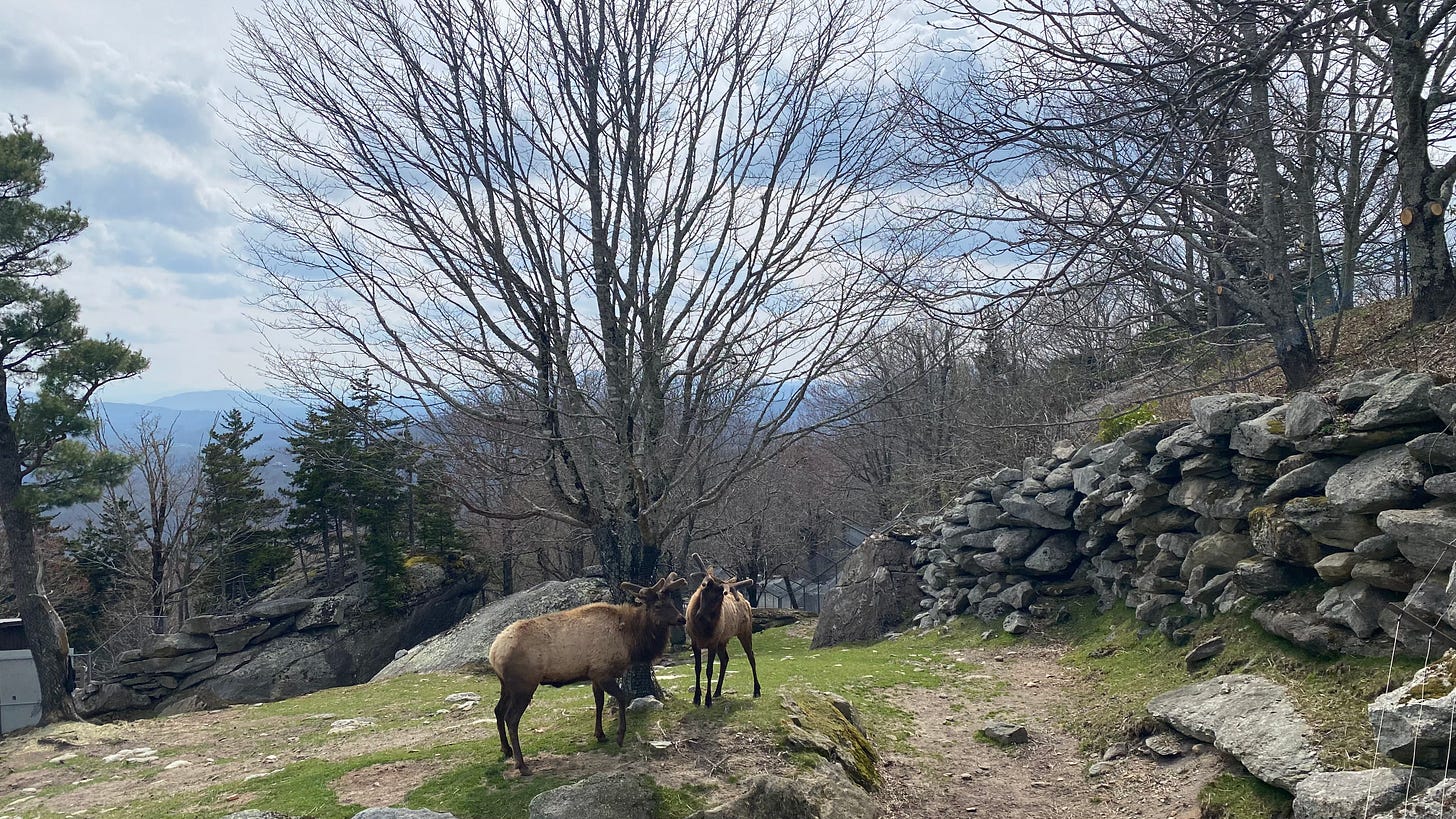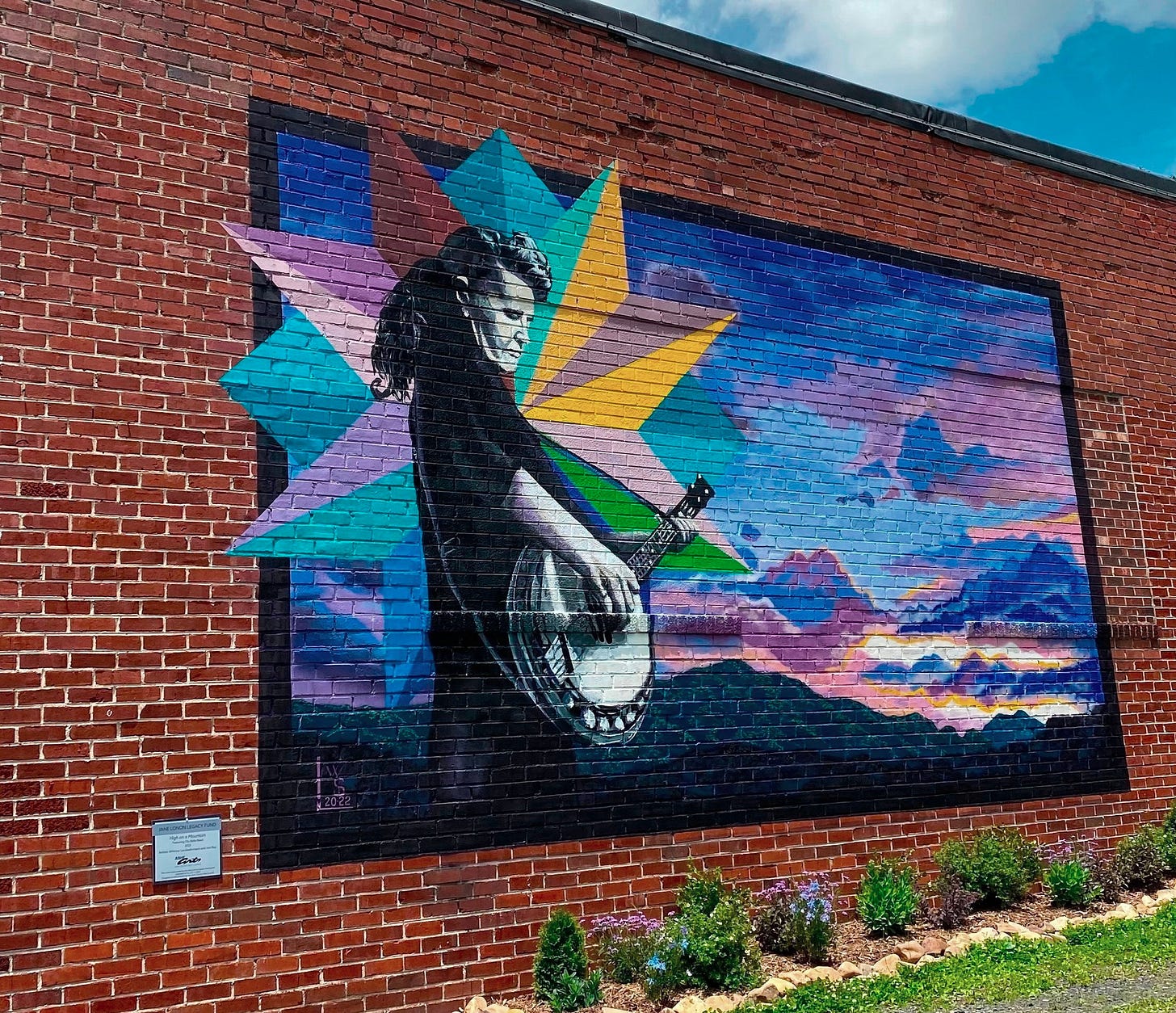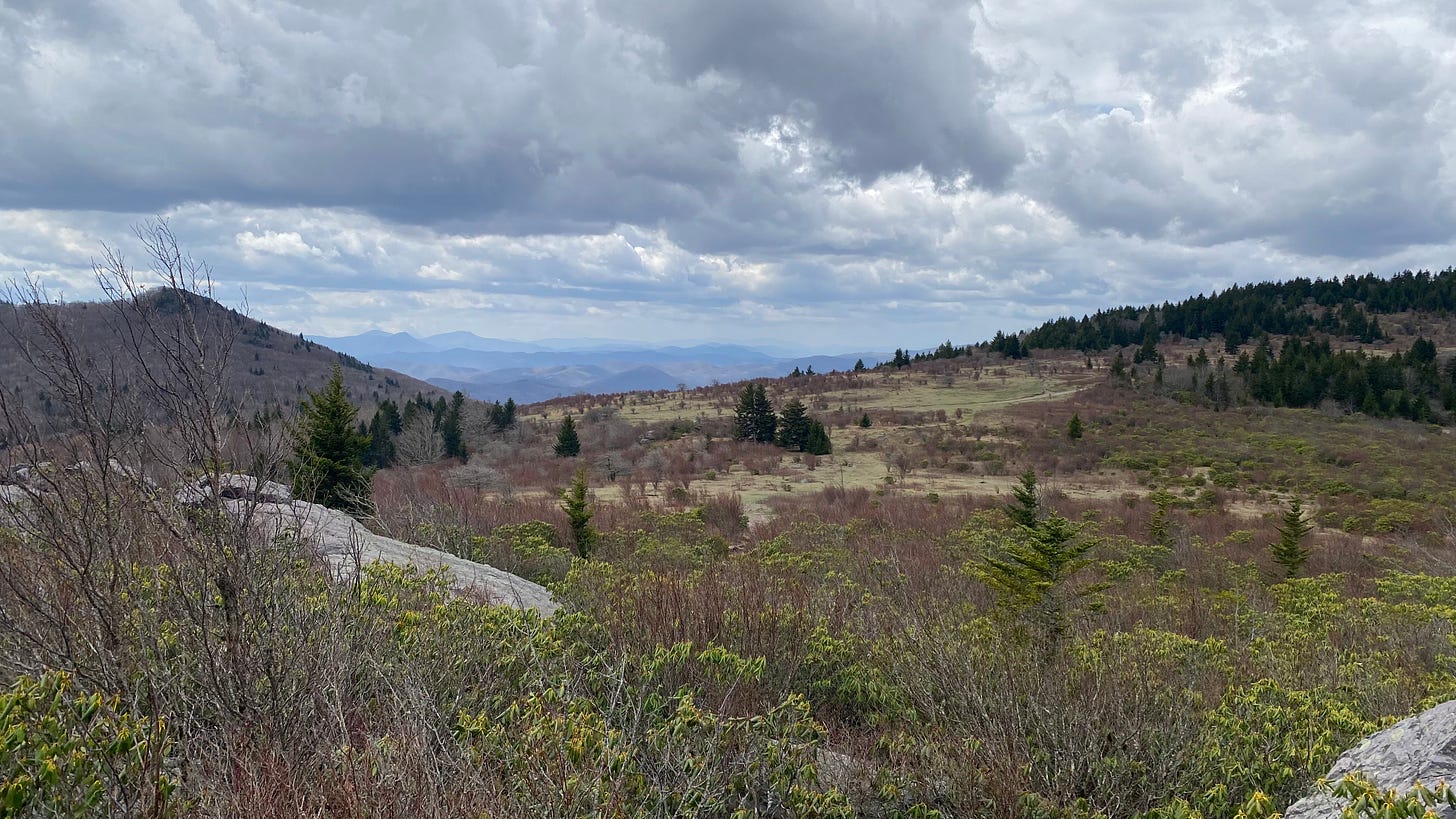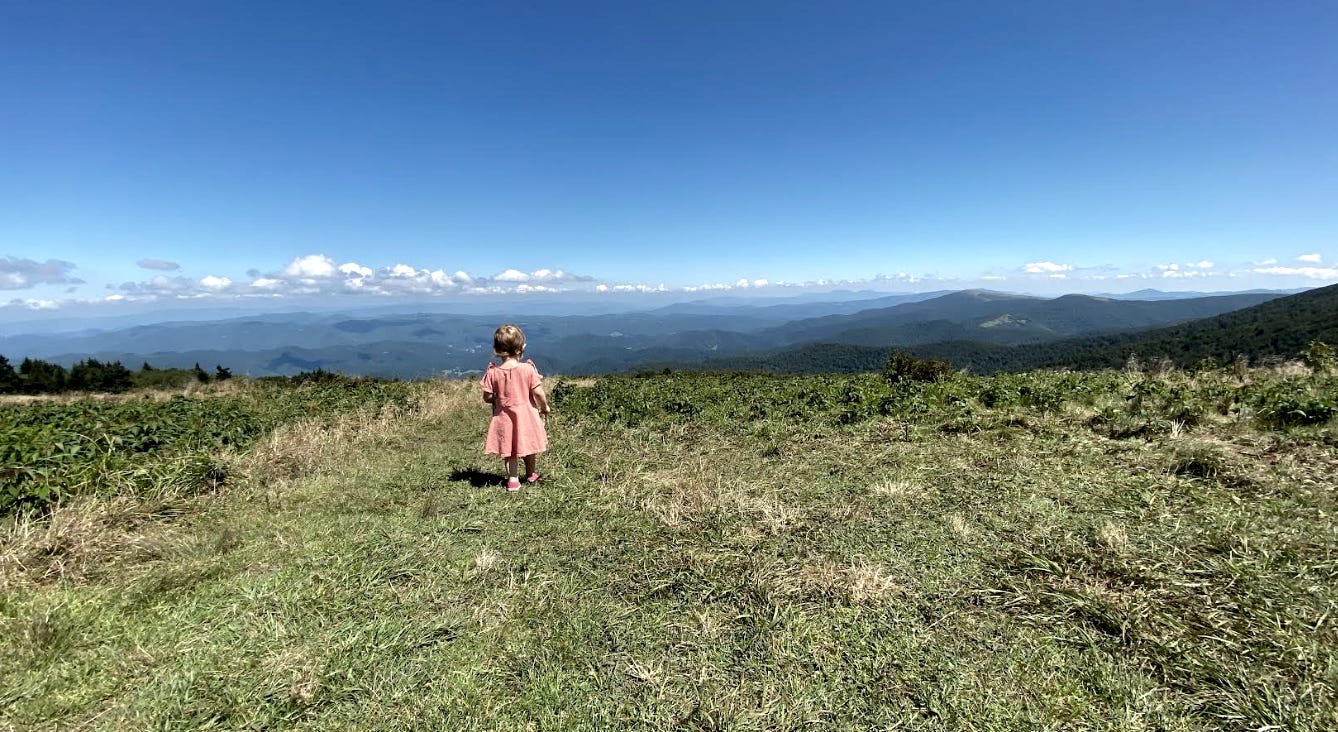MUTUALITY (noun); definition (from the Cabridge dictionary): “behaviour in which two or more people or groups feel the same emotion or do the same thing to or for each other.” From the Latin root mutuus which means “reciprocal, or done in exchange.”
I’ve been reflecting on the meaning of mutuality since my time in April at the HopeWords Writer’s Conference in Bluefield, West Virginia. Attending HopeWords each year has become a bit of a pilgrimage for me, in which I take “the long way” from Boone to Bluefield (NC Highway 16 from Jefferson, Wilson Highway to Independence, and the Grayson Turnpike to Wytheville…which in my opinion is the prettiest stretch of road in the entire country). I spend the drive reflecting on my creative work over the course of the year, what it means to be writing from this region, and what I think God might be stirring in my heart for the future. At the conference, I meet up with friends who share my creative and spiritual values. I listen to a lineup of speakers whose expertise in the craft of writing sharpen my awareness and expand my imagination.
Everyone I know who attends HopeWords has shared with me something to this effect: “there’s something about HopeWords that’s just…different.” Intentionally situated in Bluefield, HopeWords invites attendees to “Renew. Refresh. Rewrite your story,” all in a place whose own story is being slowly rewritten and re-imagined. The conference begins each year with the reading of an essay entitled Bluefield, Light of the World by founder and Executive Director Travis Lowe. The essay explores the ways Bluefield and the region of Appalachia have been misunderstood and negatively stereotyped, and how those stereotypes have been internalized by the people of the mountains. Thus, Travis begins each conference with the challenge: what if you believed better things about yourself and your story? How do words of hope change you, and therefore change the world?
Bluefield, at first glance, appears to be a time-worn artifact of the boom economy of the coal industry. Like so many places in Appalachia, whose diverse economy and rich ecology was decimated by the exploitative mono-economy of coal, Bluefield is now living in the “bust” after the boom. Driving into town, it’s hard to miss the derelict buildings and abandoned homes of this once bustling city dubbed “little New York” during its heyday. If you are just passing through, Bluefield may seem like a lost cause, a forgotten place whose best days are behind it. Like so many communities in the region, it could easily become an object of pity, a forlorn relic of a bygone era. This is, after all, the role Appalachia has played for so long in the American imagination.
For decades, people have come to this region to take. They’ve come to take the land. Take the trees. Take the coal. Take the people to work in textile mills. They come to take in the beauty of the land (and take pictures of that beauty) without ever honoring the land for more than its aesthetic value. They know little of what the land actually needs or deserves. They know little of what it truly has to offer.
But people have also come to give. Seeing the mountains as the epicenter of American poverty, do-gooders from all over have come to bestow charity upon the “destitute” of these hills and exercise their altruism in these woe-filled hollers.
What is too often missing in these philanthropic distributions is exchange. Mutuality is missing. For too long, folks have failed to realize that these mountains and their people are so much more than capital be consumed or a charity case to be solved. Mountaineers invite more than pity, and the story of this place is far more than loss and need, boom and bust. Appalachia is more than a cautionary tale or curio. I want a truer story to be written, a story that speaks to the gritty resolve and abundant hospitality of this place.
HopeWords invites people to come to the mountains to receive that hospitality. Receiving is different than taking. To receive is to believe in the true dignity of giver, to accept a blessing not just on your own terms. To receive is to believe that you may have a deep need that someone else is better able to name and to meet than you can yourself. To receive is to recognize your own dignity as someone worthy of hospitality.
Part of the mission of HopeWords is to live that shared dignity out. Travis and Robbie Gaines (director of operations), invite attendees to explore Bluefield’s local arts and recreational scene. Bluefield Black history tours are offered, as well as tours featuring and the history of coal mining in the area. Local eateries scale up their operations to meet the needs of the conference. Area churches fling wide their doors for attendees to visit on Sunday morning after the conference, and church groups bake cakes and cookies for the conference social hour.
Residents of Bluefield are blessed by conference goers. Conference goers are blessed by residence of Bluefield. It is an exchange, not just of money, but of relational engagement and mutual respect. It is the picture of hospitality extended and of hospitality received. The conference is not only an economic boon for the city, but also an infusion of energy. It is a reminder to the residents of all they have to offer.
This same dynamic of mutuality exists between attendees and speakers. The conference takes place at the historic Granada theater, where there is no greenroom and well-known authors mingle casually with attendees. Maybe it’s just me, but the feeling I get at HopeWords is that the hierarchy of the “professional” and “amateur,” of the “successful” and the “just starting out,” is flattened as we recognize together that we each have something to offer in this shared vocational endeavor that is writing creatively to the glory of God. Humility and hospitality are the true markers of our time together.
Now, this post is not meant to be a promotional piece for HopeWords (though if you’d like to join us next year, you can register here, ha!) Rather, I’ve been exploring lately what a place (particularly the region I call home) can teach us about mutuality.
As a Christian, I’m always awed by the way in which Jesus demonstrated mutual care during his time on earth. Though he was God incarnate, he sought out and received radical hospitality throughout his life. Mary housed the tiny body of the Christ child in her own body, her womb becoming the lifeline of the life-giving God. Yes, Jesus fed the five thousand. But he was also fed by the hand of Martha of Bethany, by tax-collectors, and by his disciples. His body was anointed and tended to by women after his death, even as his resurrection offered life-eternal in turn to them.
This demonstration of mutuality has done so much to transform my relationship with people who do not share my faith. The evangelistic zeal of my youth led me to go into every conversation with a non-believer with the goal of conversion rather than connection. Jesus’s engagement with all kinds of people models the idea that religious “outsiders” so often have something to teach the religious “insiders” about the ways of God. I now approach relationships with a truer belief in our mutual need for grace, and a genuine curiosity about what I might learn from the conversation. Relieved of the pressure to be the one with all the answers, I am able to give and to receive. I do not stand on some moral high ground. I stand on a divine love and grace that was freely given to me. I am the recipient of radical hospitality. What’s mine to do is live a life that extends radical hospitality to all.
What would it mean if we approached all relationships - with our families, our neighbors, and with the land - with that spirit of mutuality? Could we temper our selfishness enough to see when we are taking more than we are giving? Could we quiet our pride enough to believe others have as much care and wisdom to offer as we do? Could we be humble enough to receive radical hospitality? And could we have enough hope in our own stories to believe we all have something to offer?
That kind of mutuality sounds like a miracle we could all use in this moment.
AND NOW FOR SOME PROVISIONS:
Southern Appalachia is still on the long road to recovery after Hurricane Helene swept through 8 months ago. Fall leaf season was a near total loss last year, a devastating blow for a region dependent on tourists for its economy. And so, for this month’s Provisions, I want to offer you the provision of mountain hospitality, beauty, and recreation…Would you consider making a trip to the mountains over the summer? Would you come partake of our hospitality and provisions…and in that way, offer provision and resources to the people here who are still recovering? Come, not to take, but to receive…and in so doing, offer us the morale boost we need as we remember this place is still gorgeous and good and teeming with life.
Below are some ideas for some weekend getaways in the Southern Mountains:
Boone and Vicinity:
Known as the Heart of the High Country, Boone is the town I’m privileged to call home. There are plenty of Air BnB’s in Boone, but I recommend the newly renovated Rhodes Motor Lodge for your stay. Rhodes is also the new home of one of my favorite Boone restaurants, Over Yonder. Another great option is the Horton Hotel, an upscale boutique hotel right in the heart of Downtown. Their rooftop patio/bar is a favorite hangout spot for me and my friends!
A fun day in downtown Boone could involve shopping in all the great downtown spots (Anna Bananas consignment, The Common Good, and of course the Mast General Store). Be sure and pick up some homemade chocolate from Venture. My favorite dining spots in town are The Local, The Social (just opened!), or Vidalia. If you are looking for picnic food for an outing, be sure to stop by the Wildwood Market for some sandwiches and sides. For live music on a Friday night, head over to Booneshine or Valle Crucis Park for Music in the Valle.
Outings north of town: Head north on Hwy 194 (wave to me as you drive through Meat Camp!), and after about 20 minutes you’ll be in the charming village of Todd, North Carolina. Grab some fresh baked cookies and a drink at the Todd Mercantile and spend a day fishing, kayaking, or tubing on the New River with RiverGirl outdoor company.
Outings south of town: Take a Drive on the Blueridge Parkway and enjoy beautiful views from Thunderhill Overlook, Rough Ridge (a great short hike), and Beacon Heights (another great short hike). Spend the day at Grandfather Mountain State Park, where you’ll be sure to see Elk, Otters, and Black Bears at the mountain top zoo.
Ashe County and Grayson: Our favorite way to spend a weekend is in the West Jefferson area. It’s a little less crowded than Boone with tons of great activities. For accommodations, there are plenty of Air BnB’s here too, and there’s always the Holiday Inn Express. Start your Saturday at the Ashe County Farmer’s Market. Grab a cup of coffee at Hatchet West and enjoy all the wonderful little downtown shops. Drive to the top of West Jefferson for a hike and a picnic.
If you are here on a Saturday in late June or early July, you might catch the “you pick” days for the Good Ashe Lavendar Farm, about 20 minutes away from West Jeff. Be sure to stop in Lansing for a drink at the Old Orchard Creek Store, and shop at my friend Lindsey’s store The Squirrel and Nut. (You’ll never believe the entire downtown of Lansing was under water during Helene. Their community resilience and efforts to rebuilt have been nothing short of astounding!) In the next few weeks, Old Orchard Creek will open for blueberry picking, an experience I highly recommend!
Grayson Highlands State Park: This is one of our favorite hiking spots in the area. We love Grayson because there are some amazing 360 views that are easily accessible, and you are almost guaranteed to see the wild ponies.
Damascus and Abingdon, Virginia: If you are up for a little bit longer drive, Damascus and Abingdon could use your support too! Damascus is a hub for bikers who flock to the Virginia Creeper Trail (but note that many of the bridges are still under reconstruction for that trail). Abingdon is a beautiful historic town in South West Virginia. Several years in a row, it has been recognized as one of USA Today’s Best Small Town Food Scenes so be sure to check out some of their amazing restaurants!
Roan Mountain and Vicinity - Back down to North Carolina…little towns like Spruce Pine and Bakersville didn’t get a ton of media time, but they were nearly wiped out by the flood. This area is a little less touristy, but there are still plenty of great spots to enjoy. The Apple Orchard at Altapass is great place to grab some food, enjoy live music, and learn some history about local culture and foodways. My favorite spot to eat breakfast in the area is Mamies Breakfast Barn in Bakersville (the liver mush is to die for, and the biscuits and gravy can’t be beat). Finally, you can spend an entire day hiking along the ridgelines of Roan Mountain (which is, without hesitation, my favorite place on the entire planet).











Amen and a half to every word.
Thank you for this. Hope I can make it to Bluefield one day.